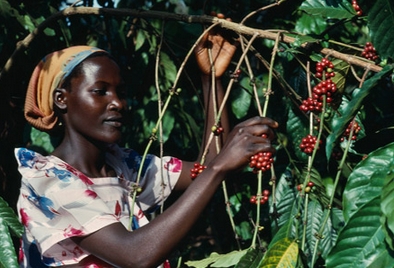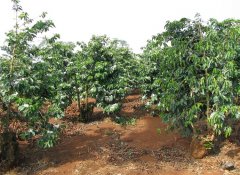Coffee plants originated from the forests of the Ethiopian plateau

Coffee plants originated from the forests of the Ethiopian plateau. It is believed that the first coffee plant appeared in undeveloped human areas (places similar to the pronunciation of caffee), where coffee got its name.
A popular legend tells the story of a shepherd named Kaldi. One day, he found that his goats were very excited. They were energetic, chasing each other mischievously and making strange noises. He noticed that the goat ate a red fruit near the bushes. He felt curious and Kaldi decided to try some berries. To his delight, his fatigue subsided quickly, and his whole body was filled with energy in an instant. Kaldi was so impressed by the strange berries that he packed a bag full of berries and took them home to show his wife. After tasting them, his wife exclaimed, "they are given to us by God. You must take them to the temple." At the monastery, Kaldi told the abbot how the berries had a magical effect on himself and his goats. The abbot, apparently disapproving, angrily threw the berries into the fire, declared them "demons", and immediately threw the berries into the stove, the pulp began to smoke, and the monastery was instantly filled with a strong aroma. The other monks quickly gathered to see what had happened. A monk quickly put out the fire from taking out a berry and putting it under his nose. He was obviously intoxicated by the rich smell of coffee, so he ordered the other monks to crush all the coffee beans into a jar and use hot water to cover the goodness of their gods. Then the monk took a sip of the so-called coffee. Since the monk vowed to drink coffee every day, the so-called coffee has been discovered ever since.
There is also evidence that coffee beans are used to make a primitive "energy bar", a nomadic tribal mountain area known as "Oromo", where people make ghee mixed with coffee powder. These "energy bars" are eaten by tribal warriors, allowing you to improve your endurance in combat.
However, some authorities claim that coffee originated in the Arabian Peninsula rather than in Ethiopia, and it is said that coffee was originally grown in Yemen. Islamic legend tells of the discovery of wild coffee plants by Sheikh Omar, who lives in a port hermit near Moka (Yemen). It is said that he once cooked some berries and then cured a mysterious disease through infusion, mainly because of the irritating effect of coffee. However, it is more likely that it was spread to Yemen through Sudanese slave coffee. The slaves were thought to have eaten coffee beans to keep them alive, and they rowed across the Red Sea between Africa and the Arabian Peninsula. There is evidence that coffee may not be treated as a drink.
It was not until the 10th century or so that coffee was officially treated as a drink. Two Arab philosophers, Rhazes and Avicenna of Bukham, both cited a drink called "bunchum", which many people thought was coffee. Because of the stimulating effect of coffee, people shout and cheer when they drink coffee, so that coffee takes the place of wine from Islamic countries. It is said to be the first coffee shop in Mecca (Saudi Arabia). Known as the "Kane Cafe", the cafe is a public place where Muslims can socialize and discuss religious issues, and the relationship between Islam and coffee is not always smooth, although it works. Some Muslims who believe in coffee are intoxicating and should therefore be prohibited by Islamic law.
In 1511, Helhana, the governor of Mecca, saw some believers drinking coffee and praying for a long vigil at the mosque. Helhana was so enraged that he ordered the closure of all cafes in Mecca. This soon aroused heated discussion among many Muslims. In the dispute, two doctors, the Hakimani brothers, denounced coffee as an extremely unhealthy food and doctors had every reason to ban it.
By the end of the 16th century, coffee was widespread throughout the Arabian Peninsula, North Africa and Turkey. The nutritional benefits of coffee are recognized as so great, and coffee is considered to be important, just like bread and water. So much so that there is a law in Turkey that if a husband forbids his wife to drink coffee, the wife can apply for divorce through legal means.
From then on, coffee continued to spread to the whole world.
Important Notice :
前街咖啡 FrontStreet Coffee has moved to new addredd:
FrontStreet Coffee Address: 315,Donghua East Road,GuangZhou
Tel:020 38364473
- Prev

Specialty coffee is essentially fair trade, not futures.
Coffee is essentially a fair trade, not as a futures. For example, in May 2006, the Manor La Esmelada Geisha coffee, the Panamanian coffee set $50.25 per pound recorded at online auction (the award-winning coffee retails for more than $100 a pound). But Panama is only a coffee-growing country. Not only in third World countries but also in developed countries such as the University of Australia
- Next

Procurement guide scheme / manual filter coffee maker
Manual filter coffee pots are permeable coffee-making utensils that give coffee a clean, bright flavor with little or no sediment. The coffee pot is also easier to clean. If you use a paper filter, the coffee grounds can be removed from the filter and poured directly into the trash can or used as fertilizer. Manual filter coffee makers are the cheapest to buy, although they are very
Related
- Detailed explanation of Jadeite planting Land in Panamanian Jadeite Manor introduction to the grading system of Jadeite competitive bidding, Red bid, Green bid and Rose Summer
- Story of Coffee planting in Brenka region of Costa Rica Stonehenge Manor anaerobic heavy honey treatment of flavor mouth
- What's on the barrel of Blue Mountain Coffee beans?
- Can American coffee also pull flowers? How to use hot American style to pull out a good-looking pattern?
- Can you make a cold extract with coffee beans? What is the right proportion for cold-extracted coffee formula?
- Indonesian PWN Gold Mandrine Coffee Origin Features Flavor How to Chong? Mandolin coffee is American.
- A brief introduction to the flavor characteristics of Brazilian yellow bourbon coffee beans
- What is the effect of different water quality on the flavor of cold-extracted coffee? What kind of water is best for brewing coffee?
- Why do you think of Rose Summer whenever you mention Panamanian coffee?
- Introduction to the characteristics of authentic blue mountain coffee bean producing areas? What is the CIB Coffee Authority in Jamaica?

